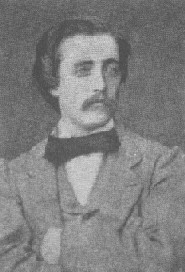From the January 1858 edition of Chess Monthly:
Mr. Morphy extends the challenge sent to the
New York Club so as to comprise all the leading practitioners of the Unites
States. He proffers any American player the odds of Pawn and Move and will be
glad to arrange a match upon those terms.
David Lawson adds, without explanation, that by
May, Morphy's "challenge to any American player, offering the odds of Pawn and
Move in a match for one hundred dollars a side, received no response."
After his success at the American Chess Congress, Paul was satisfied
that he was strong enough, and now qualified, to challenge the more experienced
players in the Old World. When he returned to New Orleans, he still had time to
kill waiting to be old enough to practice law. He spent a lot of time in the New
Orleans Chess Club where he developed his blindfold skill. No games remain, but
it was reported that at one instance he played a seven board blindfold simul
winning six and losing one. An other report announced an upcoming eight-board
blindfold exhibition.
His fellow chess players, also convinced of Paul's great chess strength,
wrote a letter to Howard Staunton, the foreign player best-known in America due
to his fame in beating St. Amant in 1843 and to his literary achievements. They
invited Staunton to come to New Orleans and play Paul for stakes of $5,000. Part
of the terms provided that he would be reimbursed $1,000, should he lose, to
cover expenses.
Samuel Boden, the chess editor of the London Field had some comments
concerning the selection of Staunton as representing the best that Europe had to
offer:
...Now, we can see no possible objection to the acceptance of this
challenge by Mr. Staunton, as a private individual, if he thinks it proper,
and we have no doubt it was made in good faith by the New Orleans Chess Club;
but.... we cannot avoid entering our protest against the selection on the part
of our rivals of a champion for our side....that he is champion of even London
alone, over the board, we unhesitatingly deny ... while on the Continent the
idea of being considered the champion of Europe would be ridiculed as the
height of absurdity....
Staunton replied most courteously to the challenge:
Gentlemen:
In reply to your very courteous proposal for me to visit New Orleans for the
purpose of encountering Mr. Paul Morphy at Chess, permit me to mention that for
many years professional duties have compelled me to abandon the practice of the
game almost entirely except in the most desultory manner, and at the present
time these duties are so exacting that it is with difficulty I am enabled to
snatch one day out of seven for exercise and relaxation.
Under the circumstances you will at once perceive that a long and arduous
chess contest, even in this Metropolis, would be an enterprise too formidable
for me to embark in without ample opportunity for the recovery of my old
strength in play, together with such arrangements as would prevent the sacrifice
of my professional engagements for the sake of a match at chess, and that the
idea of undertaking one in a foreign country, many thousand miles from here, is
admissible only in a dream.
With friendly greetings to my proposed antagonist, whose talent and
enthusiasm no one can more highly estimate, and with compliments to you for the
honor implied in your selection of me as the opponent of such a champion, I beg
to subscribe myself, with every consideration.
Yours obediently,
H. Staunton
At the same time Staunton published in the Illustrated London News,
where he had a chess column:
if Mr. Morphy - for whose skills we entertain the highest admiration - be
desirous to win his spurs among the chess chivalry of Europe, he must take
advantage of his proposed visit next year; he will then meet in this
country, in France, in Germany and in Russia, many champions whose names
must be as household words to him, ready to test and do honor to his
prowess.
Morphy took this as an implication that Staunton would play him if he were the
one to travel. Even if Staunton didn't intend this, he never once disavowed
Morphy of this belief.
 While
in New York, Paul had taken a position as co-editor of Chess Monthly. It was
originally conceived by Daniel Willard Fiske and Miron Hazeltine. Hazeltine
seemed to have been supplanted by Morphy. Morphy's chief job was to provide
annotated games, a duty he didn't appear to take very seriously. During the
interim of the letter exchanges, Morphy played many at odds games, annotated a
few games and played with visiting Mexican master, T. H. Worrall, giving
him knight odds. Worrall was able to win 8 out of 15 at those odds.
In a letter to Fiske, Morphy mentioned that he was informed of the formation
of Morphy Chess Clubs in both Texas and Maine.
All this while, Morphy was trying to procure permission for his family to travel
to Europe for the purpose of playing Staunton in London and attending the
tournament in Birmingham. On June 22 Morphy would be of legal age and his family
was concerned that such a trip would interfere with the establishment of his
professional career. Ernest Morphy and Judge Meek helped convince the rest of
his family to allow Paul's trip to Europe and at last they relented.
Daniel Willard Fiske
Morphy left for New York on May 31, 1858 where he took the
steamship, Africa
see note, bound for Liverpool, on June
9.
|

